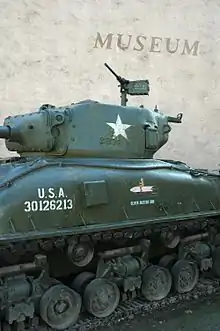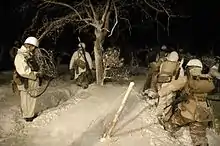
Diekirch is a town of 6,800 people (2018) in Luxembourg, best known for its brewery of the same name and the National Museum of Military History.
Get in
By car
Diekirch is located along the N7, which is a continuation of the A7 highway which runs from Luxembourg City and Mersch to the north. The N7 connects to Clervaux and Troisvierges in the north, and Ettelbruck (where it becomes the A7) in the south. When travelling from the banks of the Moselle (anywhere between Schengen and Echternach), travel downstream the Moselle and Sauer via the N10, switching to the N19 in Reisdorf.
By public transit
Diekirch can be reached by train in about 50 minutes from Luxembourg City. There are direct trains every hour (except on Sundays), but usually you'll need to transfer to a shuttle service at Ettelbruck as the 🌍 Diekirch train station is located at an awkward branch from the main line, with it being the only station on the branch.
Busses connect Diekirch to Beaufort, Colmar-Berg, Echternach, Ettelbruck, Grevenmacher, Larochette and Redange.
Get around
Diekirch can be easily covered on foot. The town center with the pedestrian zone Grand-Rue (Groussgaass) is about 1 km away from the train station. The Military Museum is in the Bamerdall just up the hill from the central church towards Fridhaff.
See

- 🌍 National Museum of Military History (Musée National d'Histoire Militaire), 10 Bamertal, ☏ +352 80 89 08, reception@mnhm.lu. Tu-Sa 10:00 to 18:00, : closed. The museum was born from the initiative of a small group of collectors and history buffs and opened its doors 1984 in the old brewery of Diekirch. Over the years, the collection has witnessed a constant influx of objects. At first, the museum was mainly meant to cover the Battle of the Bulge, but an additional permanent exhibition on the Luxembourg Army was opened in 1994. With the opening of this new part, the museum got its current name, "Musée National d’Histoire Militaire", or MNHM for short by ministerial decree. Today the museum is run by a non-profit organisation and subsidized by the state. The museum's main attraction are its 1:1 scale dioramas. These are mostly detailed and realistic reproductions of scenes from the daily life of soldiers and civilians during the Battle of the Bulge. The largest diorama (150 m2) shows the crossing of the Sauer river on January 18, 1945 by units of the 5th US Infantry Division, in order to liberate the city of Diekirch. In addition to the dioramas, the museum has a large collection of military equipment and soldier's personal belongings, as well as a selection of Allied and Axis military vehicles and artillery that were used during the Battle of the Bulge. €5, optional audioguide €3.
- 🌍 Musée d'Histoires Diekirch (Museum of Diekirch History), 13 Rue du Cure, ☏ +352 80 87 90 1. Tu-Su 10:00-18:00, closed on Mondays.
- 🌍 Musée Automobile - Conservatoire National de Véhicules Historiques (Historical Car Museum), 20-22 Rue de Stavelot, ☏ +352 26 80 04 68, fax: +352 26 80 06 56, cnvh@pt.lu. Tu-Su 10:00-18:00, closed on Mondays.
Do
- 🌍 Parc Municipal, Avenue de la Gare. A decently sized park by the side of the river Sauer offers a good getaway from the city.
- 🌍 Mambo Ride. A 160-m-long wildwater kayak training canal.Only on advanced booking minimum 1 week ahead.
- 🌍 Montée du Herrenberg Viewpoint. Hike up the N7B and enjoy the view over Diekirch.
Buy
Eat
- 🌍 Rodizio Grill, 1 Esplanade, Diekirch, ☏ +352 26 80 47 15.
- 🌍 Beim Franco, 12 Grand-Rue, Diekirch, ☏ +352 26 80 48 58.
- 🌍 Beim Charel, 1 Rue d'Ettelbruck, Ingeldorf, ☏ +352 26 80 39 83.
- 🌍 Atithi, 15 Rue Clairfontaine, Ettelbruck, ☏ +352 26 81 37 70.
Drink
Diekirch has a large brewery building right across the tracks from the train station.
- 🌍 Café des Ardennes, 2 Esplanade, ☏ +352 26 80 44 72.
- 🌍 Café Miche, 8 Rue de Brabant, ☏ +352 80 31 65.
- 🌍 Café Beim Frank, 5 Place de la Libération, ☏ +352 26 80 39 15.
- 🌍 Riva Café, 1 Route de Larochette, ☏ +352 26 80 02 70.
Sleep
- 🌍 Hotel du Parc, 28 Avenue de la Gare, ☏ +352 80 34 72 1, info@hotel-du-parc.lu. €95.
- 🌍 Camping de la Sûre, 34 Roude de Gilsdorf, ☏ +352 80 94 25, tourisme@diekirch.lu. €24.
Go next
- Ettelbruck and Diekirch both border the town of Ingeldorf. Combining your stay with a visit to Ettelbruck is by no means discouraged.
- Vianden can best be reached via the N17 within half an hour. Its main attraction is the castle of the same name, which without doubt is the best visited tourist attraction of the country.
- Luxembourg City, the nation's capital, is found at the other end of the A7, which starts just south of Ettelbruck.
- Using the motorways south of the city (A3 and A4) will end you up in the Land of the Red Rocks, which has a big industrial heritage.